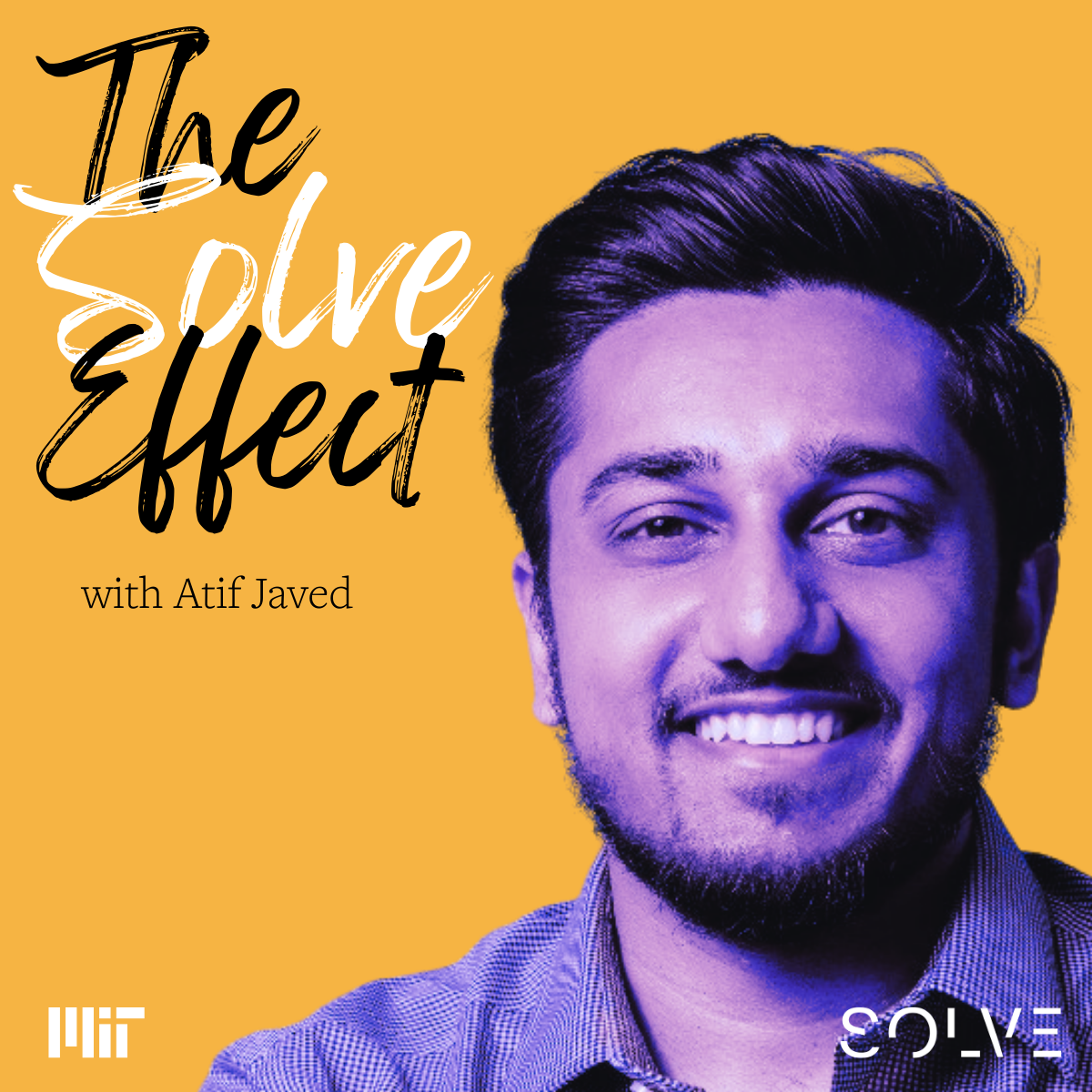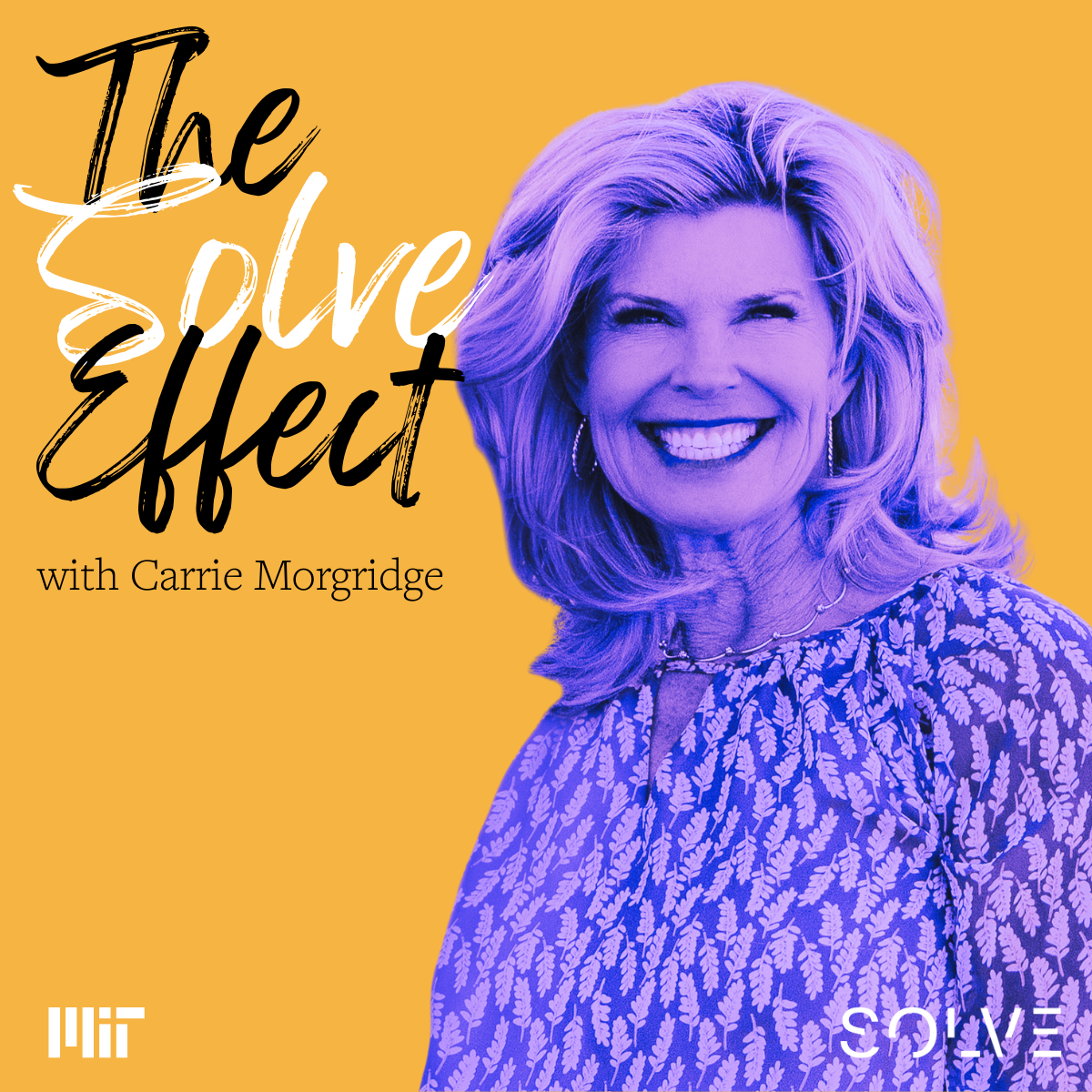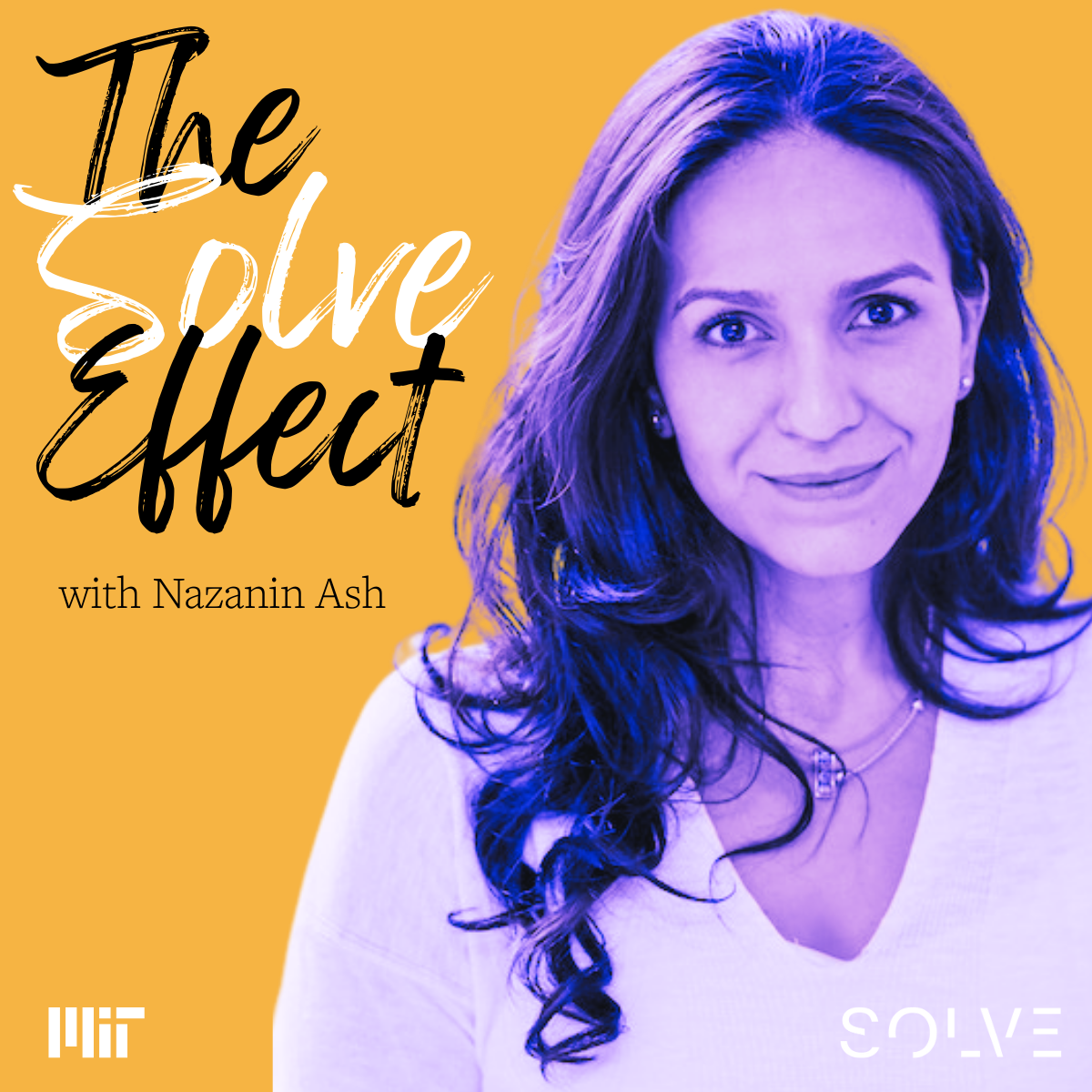
The Solve Effect Podcast - Episode 4 - A Tech Maximalist: Atif Javed on Human Connection Through Technology
This is a transcript of Episode Four of The Solve Effect, edited and condensed for clarity. Listen on Spotify, Apple Podcasts, Amazon Music, or iHeart Radio.
Hala Hanna
Welcome to The Solve Effect, where we spotlight extraordinary people tackling the world's toughest challenges with bold, innovative solutions. I'm your host, Hala Hanna.
Imagine for a moment that you're nine years old, newly arrived in the US right after 9/11, and you become the voice for your hijabi grandmother at doctor's appointments and wherever else she needs to navigate this new world. Fast forward twenty years, and that same child has now built a platform that connects tens of thousands of volunteer translators with refugees and displaced people.
Today's guest is Atif Javed, co-founder and Executive Director of Tarjimly, which we selected for our 2022 Health Equity Challenge. In the age of AI, Tarjimly ensures that when someone desperately needs to be heard and understood, there's a human ready to bridge that gap.
Here's what makes this conversation especially compelling: we're talking to a self-described "technology maximalist" who's choosing humans over algorithms, a Silicon Valley veteran who walked away from the traditional startup path to focus on scaling an impactful and needed solution.
We will explore how Atif is navigating the intersection of AI and human dignity, building financial sustainability in uncertain times, and why he believes that the crises of today require us to find that one problem we can wake up every day determined to solve.
Atif Javed
Thank you. Thank you for having me.
HH
Why do you do what you do? What is it that you're set out to do in this world?
AJ
Yeah! So I started Tarjimly in 2017. I graduated from MIT. Coming out, working in Silicon Valley for several years, I felt a little bit of disenchantment with the type of work that I was doing. But generally, I saw the Syrian refugee crisis really take shape and hit the world.
My friends and I spent some time volunteering in refugee camps, working on the ground, trying to find ways to help. One of the most obvious things that came out was we were spending. . . 95% of our time interpreting and translating in Arabic, Urdu, Farsi, and Pashto, whatever it was—me and my circle of friends. . . we were very cautious about trying to be voluntourists. We didn't want to just come in and you know, do the whole oh, like help people overseas and then leave. And I think that was the realization that started Tarjimly, where we said, “Hey, there are thousands of our friends, you know, who could do this type of work, and like we're going to leave, but is there a way we can reconnect with those people and be back and available to interpret for them?
Can we enable our friends and family just to be volunteer translators for those people, like we did? And so we don't have to fly and be there on the ground, and things like that, which is crazy, right? There's just not a good, you know, instant access to interpretation.
And it seems so fundamental. It's like the absolute basic thing that this person needs to be able to get, humanitarian help, to get health support, to get any of the services that these NGO's are providing on the ground, you just can't actually do the work fairly, adequately, or correctly if you don't have good interpretation and language access for people.
And so that really took off for us when we saw this community of Afghan and Syrian women who were coming for mental health support in this center called The Hope Center. And there was a woman from Florida who was just a regular, you know, social worker in Florida who was like, “Uh, I can't talk to any of these people. And I'm here for six months. What the hell do I do?” And she found Tarjimly, and she just started using it literally every day to talk to these women who are facing, you know, sexual abuse in the camps, who are facing food malnutrition, who are facing all these crazy stories. And we were like, oh, my God, we’ve hit on something here that could actually, genuinely change someone's life.
It was interesting because I never thought about this, but when I looked back on my own life, I started to reflect and realize, oh, there was a personal experience that kind of drove me in this direction.
I moved to the United States in 2001, right after 9/11. So I came as, like, a Muslim family with my hijabi grandmother, me and my brother, just here in the new country right after 9/11 in in Washington, DC area. It was a tough time to be a visible Muslim at that point. And you know, she would need help everywhere to go to the doctor's office, to get on the employment, line to take us to school. We were interpreting for her at school, to get signed up for school. You are basically the child interpreter for your family, your uncles, your aunts, your grandmother, whoever it is. That's such a common immigrant story. Right?
I didn't realize, like, that was my story. It's like a nine-year-old or ten-year-old coming to the country, just being my own interpreter for my family.
So it all came full circle for me. Where that moment of realization was like…wow, these people, these women, in this refugee camp are exactly like my grandmother. And they would say the same things like, a woman you said to us, “It was like being blind before you guys came.
This, like, sort of took us full circle where we said, “There is not just a problem, but there's a very easy solution.”
HH
What a powerful way to translate your personal experience to address such a universal, kind of fundamental need that we all have to be heard and understood. And I love that you turned from translating to your grandmother to translating to the world and creating that, you know, Wikipedia of local language access.
You know, you started in the first Trump administration, and now at the second, the waves of anti-immigration of defunding international development are clashing with an increased need for refugees, whether it's from climate or from the instabilities that we're seeing now. Tell me what this moment means for you and for Tarjimly and how you're adapting.
AJ
Yeah. Look, I won't pretend like it is not a very tough moment. It's not just for us in our organization and the work we do in the space…we're hitting social headwinds in all directions.
We have, you know, D.O.G.E., and humanitarian relief getting hit. We have philanthropy getting hit…who is sort of falling in line with the directive of the government.
There's AI and generative AI, which I'll talk about in detail about. That's a headwind against human translators and interpreters.
So the headwinds are strong. And honestly, there's a lot of there's a lot of difficulty right now in the sector, including for the 1400 organizations that use our platform. So all of them are facing budget cuts. They're facing difficulties. People are losing their jobs. It is a very, very tough moment for the entire sector.
HH
Bad companies are destroyed by crisis, good companies survive crisis, and great companies are transformed by them. And so when we were chatting before, it sounds like you are actually transforming the way you think about your mission and how it applies in the world. And so I'm really interested to hear about that.
AJ
Yeah, yeah.Let's tackle all three directions of headwinds.
Number one is the headwind in refugee resettlement and humanitarian support. We continue to provide critical needs and services—even for free. If an organization is struggling with translation services or the budget, we will provide that for free because we think the impact is more important than anything else.
We had always kind of moved in the direction of Tarjimly actually can become a self-sustainable NGO. Everyone wants to strive towards a golden star of being self-sustainable, meaning that you create earned revenue. The earned revenue funds 80-100% of your budget, and then philanthropy serves as innovation capital on top of that.
We've always wanted that direction because we believe that there is a paid sector and a paid ecosystem for this high-quality professional interpretation. So we started as a Facebook Messenger bot, and we moved into our own mobile app when we, you know, thought about data privacy and all the concerns that people had with Facebook. And I will say, like this is where I think a lot of, you know, tech nonprofits will die, right? Like they just won't be able to build out a best-in-class technology service. We spent like a year refactoring our service when we needed to.
So we built out that technology. We said, “Hey, there's an opportunity for us to start focusing on not just the humanitarian relief sector, but health, legal services, education.” We kind of kept it open and broad to say, look, if you need support in whatever sector it is, translation is fundamentally a broad-based service. We will allow that. For that, this is where some of the partnerships with you know, CSR came in, where employees wanted to volunteer on Tarjimly as part of their organization. We even have some companies that have started to use Tarjimly, who hire refugees and immigrants and need to actually communicate with them. Then we started to extend out in terms of financial sustainability. We said, let's build a premium model, let's build a platinum model, let's actually hire refugees and immigrant interpreters, who would be really amazing professional interpreters and drive economic value to them.
This is one of the programs I'm most proud of at Tarjimly. We have something called Tarjimly Talent, where we hire refugees who are bilingual for rare languages where we can't get a thousand volunteers.
We have Rohingya refugees in a Bangladesh refugee camp making a full-time income on Tarjimly today. The fact that we can drive economic value to at least, you know, refugees and people who speak the languages of need. We're now able to create an economic layer around Tarjimly that says, “Hey, you can get paid for the translation that you do.”
And then the third part of the headwind was AI. This is where people, and even before AI, people were like, “Well, can't you do that with Google Translate?” Number one, anybody who has tried these languages knows that Google Translate is just not good at these languages. There's the challenge, especially in a critical scenario in a health scenario like, you really need to be high quality.
So AI is a fantastic resource. Now it is getting much better. It is improving the quality and I think there is a world as a technology maximalist where AI will be a strong source of translation and interpretation technology for even the long tail of languages.
What I'd like to see is a world where you actually know when the AI is good and when it's not. And so this is what we're building at Tarjimly now, beyond our human ecosystem. We have 66,000 human translators, so we're able to connect you with a human interpreter or translator in 90 seconds. You want a human in the loop, and then you want them to be enabled to do their job more efficiently with AI.
So we started with Tarjimly First Pass, where translators can now very rapidly get interpretation through AI and then correct and refine the interpretation and send that forward, or communicate that forward. That we're now using as a corpus of data to help fine-tune LLM translations to be able to actually work effectively in those humanitarian, health, legal, education settings. We will help you know when there is a risk or a low confidence or something that potentially could be risky in that AI translation and give you the opportunity to connect with a human interpreter in the loop.
This is how technology, I think, and AI should be used, where it is complementary. It is an augmentation of humans.
HH
I would imagine, also that that data is extremely valuable even as a commercial opportunity. Is this something that you think about as another kind of income generation?
AJ
I think this boils down to what you want to achieve as a leader of an organization and and the mission. There's two reasons we didn't go down this path with Tarjimly to begin with.
Number one was that we were leveraging volunteers. I don't think that…that pain point that I told you in the beginning about people wanted to have a way to help, that is not something that you can monetize. It is a human feeling that people want to be able to connect and support other humans who are in vulnerable situations. That is not, in my opinion, a monetizable thing. That is where truly the nonprofit element of the work comes in. And so I do think that that ecosystem, that what we've built there is something that needs to, like, grow, live sustain, be a nonprofit.
That said, I'd like to know and figure out very carefully what is the thing that has true long-term growth potential and value that would allow for potentially a for-profit spinoff that could ultimately fund and continue to support that nonprofit and its mission and things.
I think it's hard to be able to say, “Oh, I'm just gonna spin that out and figure it out.” And like, you really have to have a clear picture that there is an economic business model. We have a SaaS offering that we offer to people. We have the AI translation work. We have the fine-tuning in the data that we have.
So there are things that we could look at, but again it's two things. One: is that going to keep your community, and two: is that what you want to work on as a leader, right?
So maybe, you know, my desires will change to start building out a for-profit arm, or maybe there's a partner who will come in with me. But I think it is important to consider, like, my goal as a person is to help millions and millions of refugees like that, that if I can, you know, be on my deathbed and say, you know, to God that I did that. I achieve that, that that would be something that would, I would be profoundly happy about. And it is the thing that I should strive towards more than trying to make money or shareholder value or like, what do these VCs want? This is all very risky games that you get into thereafter. So I do think that there's something about what does the leader or the heads of the organization want to achieve in their mission? And I think that's where I'd like to see Tarjimly be long-term.
HH
It's all about the leaders at the end of the day; it takes leaders with the moral clarity and the kind of commitment to the mission that you have that creates such a North star for the whole organization. I think that's beautiful. It's also quite impressive that you're talking about this ecosystem, and it's true, it's the ecosystem of all of these different partners, whether it's the refugee communities, whether it's the volunteers.
I love, by the way, how it started with voluntourism-ish. And then it evolved into micro-volunteering, and the corporate partners that you work with and the humanitarian partners. So I'd love to hear how you think of so many different stakeholders and their different needs, and how each of them, I mean, fits into the puzzle in a way.
AJ
Yeah. So we have, you know, philanthropy and foundations and private donors. We have CSR and corporates and companies that support our work. We've had Google, Amazon, you know, HP, Boeing, all these different, you know, funders of our work. And there's. . .what's cool about that model is there's a way for their employee base to be involved in our work and like, do the volunteering, be connected to that problem. It is showing some headwinds now. The refugee, immigrant, asylum-seeker narrative is not the most exciting narrative for tech companies and or companies in general to be a part of, which is really sad and, you know, frustrating to see. . .like, I'll just do something safe like fun, you know, healthcare or education or something. So like, there's becoming a changing and shifting. There's the end beneficiaries, the refugees that we want to serve. There's, you know, the volunteer community. There's a lot of stakeholders for sure.
HH
You're able to sustain any headwind almost because your risk is kind of distributed. But how do you balance that with…I also need to be obsessed about my users and they all are so different, to your point about, you know like being user-centric and serving that user.
AJ
Yeah. I think we have built out a proper, you know, product and growth team that works seamlessly together to help figure out from user interviews, surveys, you know, sales calls, that engine that you would take from a, you know typical startup that you build into product isone of the most important, you know connection points. I was a product manager for many years. I understand what that connection between users, growth, sales, and feedback to product looks like in order to build the broad-based things that are needed by organizations and build a milestone and strategy and timeline that gets us to more and more things. We could build all these cool technology tools for CSR, Tarjimly Talent, or SaaS software, or we could try to sort of frame that up in a proper product road map that milestones and figures out what's the most important thing. This is hard, like that's not easy for any organization to be able to say, OK, there's so many things I could do. What the heck do I go build? That is literally what I was trained to do at MIT, you know, at Silicon Valley is to figure out what do we build, why? What's the strategy? What's the milestone thesis-driven product development?
HH
I really appreciate how you've walked us through how your training as a technologist and a product manager feeds into your strategizing for your own business and it makes those things easier. It's like you are the leader. You are the leader for this. You are the person to do this. And I want to say, Atif, for me, you're the anti-tech-bro. So I just.
AJ
I tried to take—I try to take all the good and leave the bad.
HH
Do you have any last kind of parting thoughts? Any advice? What would you like to end this on?
AJ
I'll end this on just a little bit about the moment that we're in, because it's just so critical. When I started Tarjimly seven years ago, I thought we could do so much to help the refugee crisis. The refugee crisis has doubled in that time. And it's hard to see it. It's hard to see the world we're in. We're going into World War 3. It is a really tough time. To be in this moment to be, you know, thinking about all that's happening in the world, think about how many more people are going to suffer, how many more refugees are going to be created.
I'd love for more people to think very deeply about the one thing that they can focus on, and they can try to hammer away at for years and years and years. This is the only thing that I think makes Tarjimly truly special, it was that I said to myself, “What is something that I could wake up every day and continue to feel like that's a problem I want to work on?”
HH
That is a beautiful, beautiful message. Thank you so much for spending the time for really just doing what you do and bringing all of your everything, from your religion and tradition to, you know, the tech skills that you have. All of this is just so needed in the world today, and I'm just so thankful you're doing what you’re doing.
AJ
Thank you so much, Hala. Thank you for your time. Thank you to the team—like MIT, Solve has been a massive inflection point for us in finding the support that we needed in focusing on our technology. I think MIT Solve is one of the few organizations that also looks at your solution, like what are you building, how does that fit into the world. You are really solution-driven thinking about problems, and I just absolutely love that, especially being an MIT grad and everything. So yeah, thank you all for the support that you've given us in this journey. I can’t tell you how much I appreciate it.
HH
What strikes me most about Atif's story is how it demonstrates the power of lived experience meeting technological innovation.
Tarjimly is a reminder in our rush toward automation, that some human connections are irreplaceable. When a woman in a refugee camp says "it was like being blind before you came," when Rohingya refugees in Bangladesh camps earn full-time income as professional interpreters, when a Florida social worker can finally communicate with trauma survivors—these are affirmations of human dignity.
As we face what Atif calls an era of multiple headwinds, his approach offers a blueprint for mission-driven entrepreneurs: stay obsessed with your users, build sustainability without compromising values, and remember that the most powerful technology amplifies human potential rather than replacing it.
Atif's parting wisdom resonates deeply: find that one thing you can wake up every day determined to work on.
Thank you for listening to The Solve Effect. I'm Hala Hanna, and we'll be back with another story of extraordinary impact. Until then, keep solving.
This episode of The Solve Effect was produced by Bridget Weiler and Elisabeth Graham, with audio engineering and editing by Chris McDonnell. Theme music by Max Natanagara. If you would like to support the show, subscribe or leave a review wherever you get your podcasts. Visit solve.mit.edu or find us on social media.
Tags:
- Health
- Podcast
- Innovation
- Leaders
Related articles
-
A Transformative Philanthropist: Carrie Morgridge on Joyful Giving, Courage Money, and Family Foundations
What does joyful and courageous giving look like in practice? Carrie Morgridge, Co-Founder and CEO of the Morgridge Family Foundation, has a few ideas.
-
Did AI Get It Right?
Reviewing screening outcomes for the 2025 Global Challenges
-
A Social Impact Visionary: Nazanin Ash on Welcome.US, Collective Power, and Mutual Flourishing
In this episode of The Solve Effect, we sit down with Nazanin Ash, CEO of Welcome.US, to explore how millions of Americans are reshaping what safe, legal immigration can look like—one act of welcome at a time.